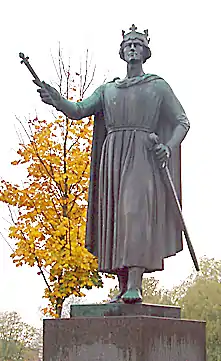1168
Year 1168 (MCLXVIII) was a leap year starting on Monday (link will display the full calendar) of the Julian calendar.
| Millennium: | 2nd millennium |
|---|---|
| Centuries: | |
| Decades: | |
| Years: |
| 1168 by topic |
|---|
| Leaders |
|
| Birth and death categories |
| Births – Deaths |
| Establishments and disestablishments categories |
| Establishments – Disestablishments |
| Art and literature |
| 1168 in poetry |
| Gregorian calendar | 1168 MCLXVIII |
| Ab urbe condita | 1921 |
| Armenian calendar | 617 ԹՎ ՈԺԷ |
| Assyrian calendar | 5918 |
| Balinese saka calendar | 1089–1090 |
| Bengali calendar | 575 |
| Berber calendar | 2118 |
| English Regnal year | 14 Hen. 2 – 15 Hen. 2 |
| Buddhist calendar | 1712 |
| Burmese calendar | 530 |
| Byzantine calendar | 6676–6677 |
| Chinese calendar | 丁亥年 (Fire Pig) 3864 or 3804 — to — 戊子年 (Earth Rat) 3865 or 3805 |
| Coptic calendar | 884–885 |
| Discordian calendar | 2334 |
| Ethiopian calendar | 1160–1161 |
| Hebrew calendar | 4928–4929 |
| Hindu calendars | |
| - Vikram Samvat | 1224–1225 |
| - Shaka Samvat | 1089–1090 |
| - Kali Yuga | 4268–4269 |
| Holocene calendar | 11168 |
| Igbo calendar | 168–169 |
| Iranian calendar | 546–547 |
| Islamic calendar | 563–564 |
| Japanese calendar | Nin'an 3 (仁安3年) |
| Javanese calendar | 1075–1076 |
| Julian calendar | 1168 MCLXVIII |
| Korean calendar | 3501 |
| Minguo calendar | 744 before ROC 民前744年 |
| Nanakshahi calendar | −300 |
| Seleucid era | 1479/1480 AG |
| Thai solar calendar | 1710–1711 |
| Tibetan calendar | 阴火猪年 (female Fire-Pig) 1294 or 913 or 141 — to — 阳土鼠年 (male Earth-Rat) 1295 or 914 or 142 |
| Wikimedia Commons has media related to 1168. |

King Valdemar I (1131–1182)
Events
Levant
- Late Summer – King Amalric I of Jerusalem, and Byzantine emperor Manuel I (Komnenos), negotiate an alliance against Fatimid-Egypt. Archbishop William of Tyre is among the ambassadors sent to Constantinople, to finalize the treaty.
- Autumn – William IV, count of Nevers, arrives in Palestine with a contingent of elite knights. In Jerusalem he is present during a council with Amalric and other nobles to decide for an expedition to Egypt.
- October 20 – Amalric I invades Egypt again from Ascalon, sacking Bilbeis and threatening Cairo. In November, a Crusader fleet sails up the Nile and arrives in Lake Manzala, sacking the town of Tanis.[1]
- Nur al-Din, Zangid ruler (atabeg) of Aleppo, sends an expedition under General Shirkuh to Egypt on request of the Fatimid caliph Al-Adid. He offers him a third of the land, and fiefs for his generals.[2]
Egypt
- December 22 – Afraid that the Egyptian capital Fustat (modern-day Old Cairo) will be captured by Crusader forces, its Fatimid vizier, Shawar, orders the city set afire. The capital burns for 54 days.
Europe
- King Valdemar I (the Great) of Denmark conquers the Wendish capital city of Arkona on the island of Rügen (modern Germany). The Wends become Christians and subject to Danish suzerainty.
- Henry the Lion, duke of Saxony, marries the 12-year-old Matilda (or Maud), daughter of King Henry II of England.[3]
- The newly born Commune of Rome conquers and destroys the rival neighboring city of Albano (modern Italy).[4]
- Sicilian Chancellor Stephen du Perche is accused of plotting to claim the throne and forced to flee.
Asia
- April 9 – Emperor Rokujō is deposed by his grandfather, retired-Emperor Go-Shirakawa, after an 8-month reign. He is succeeded by his 6-year-old uncle, Takakura, as the 80th emperor of Japan.
- Yuanqu County (known as Wanting County) in China is destroyed by a flood of the Yellow River.
Religion
- September 20 – Antipope Paschal III dies at Rome after a 4-year reign. Giovanni di Struma is elected as his successor and will reign as Antipope Callixtus III with support from Emperor Frederick I.
Births
- August 31 – Zhang Zong, Chinese emperor (d. 1208)
- November 19 – Ning Zong, Chinese emperor (d. 1224)
- Ibn Muti al-Zawawi, Arab jurist and philologian (d. 1231)
- Robert of Courtenay, French nobleman and knight (d. 1239)
- Temüge (Otgon), brother of Genghis Khan (d. 1246)
- William de Ferrers, 4th Earl of Derby (approximate date)
Deaths
- January 17 – Thierry of Alsace, count of Flanders (b. 1099)
- April 5 – Robert de Beaumont, English nobleman (b. 1104)
- September 20 – Paschal III, antipope of Rome (b. 1110)
- October 24 – William IV, count of Auxerre and Nevers
- November 5 – Hugh IX (Lusignan), French nobleman
- Abu al-Najib Suhrawardi, Persian scholar (b. 1097)
- Bermudo Pérez de Traba, Spanish nobleman (b. 1088)
- Conrad of Babenberg, archbishop of Salzburg (b. 1115)
- Wivina, French Benedictine abbess and saint (b. 1103)
References
- Steven Runciman (1952). A History of The Crusades. Vol II: The Kingdom of Jerusalem, pp. 309–310. ISBN 978-0-241-29876-3.
- Steven Runciman (1952). A History of The Crusades. Vol II: The Kingdom of Jerusalem, p. 311. ISBN 978-0-241-29876-3.
- Hywell Williams (2005). Cassell's Chronology of World History, p. 126. London: Weidenfeld & Nicolson. ISBN 0-304-35730-8.
- Vigueur, Jean-Claude Maire (2010). L'autre Rome: Une histoire des Romains à l'époque communale (XIIe-XIVe siècle). Paris: Tallandier. p. 314.
This article is issued from Wikipedia. The text is licensed under Creative Commons - Attribution - Sharealike. Additional terms may apply for the media files.